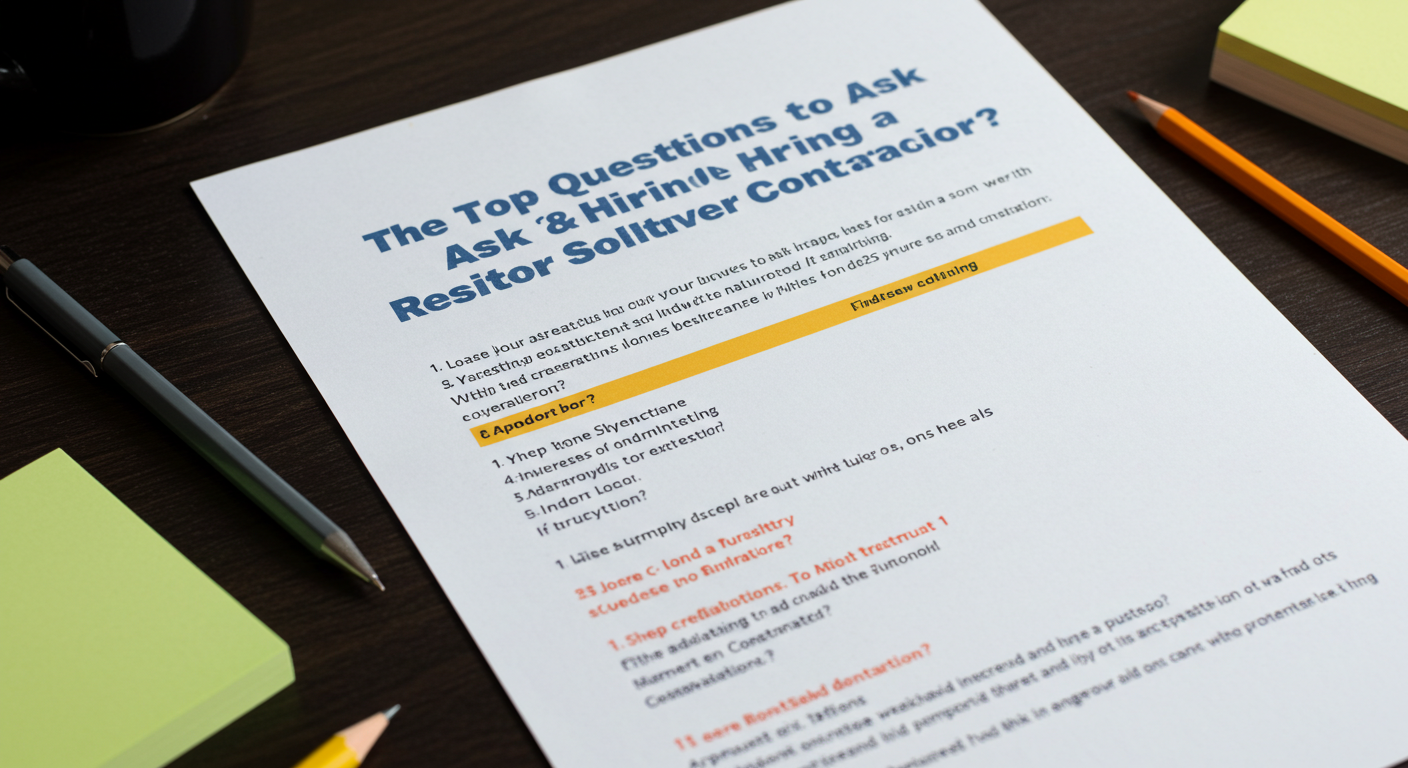Switching to solar energy is a significant decision that requires careful consideration, and choosing the right contractor is one of the most critical steps in the process. A well-installed solar system can provide decades of savings, while a poorly handled installation can lead to inefficiencies, safety risks, and unnecessary costs. Asking the right questions before hiring a contractor ensures homeowners get a reliable system that meets their energy needs. From understanding the installation process to discussing warranties and financing options, being informed helps prevent unexpected issues. We will explore the key questions homeowners should ask before hiring a residential solar contractor, ensuring a smooth and successful transition to solar power.
Key questions to ask before hiring
- What Experience Do You Have with Residential Solar Installations?
When hiring a residential solar energy contractor, it is essential to understand their background in residential solar installations. Installing solar panels on homes differs from commercial projects due to roof type, available space, and household energy needs. A contractor who has worked on similar homes will be familiar with these challenges and know how to design a system that maximizes energy production. Homeowners should ask how many residential systems the contractor has installed and whether they have worked on similar roof structures or layouts. Experience also extends to handling permits, utility approvals, and inspections, which are crucial steps in the installation process. A contractor who understands local regulations and has completed installations in the area will be better prepared to navigate these requirements efficiently. Asking for references from past customers can also provide insights into the contractor’s quality of work and reliability. Ensuring the contractor has the right background helps avoid complications and ensures a successful installation.
- What Type of Solar Panels and Equipment Do You Use?
The quality of the solar panels, inverters, and other equipment used in an installation directly impacts the system’s efficiency and longevity. Different types of panels vary in performance, durability, and warranty coverage. Some panels offer higher efficiency rates, allowing homeowners to generate more power even in limited space. Understanding the brands and models a contractor offers helps homeowners make an informed decision about the system they are investing in. The inverter is another critical component, as it converts solar energy into usable electricity for the home. Homeowners should ask whether the contractor uses string inverters, microinverters, or power optimizers, as each has different advantages based on the system design. Additionally, the mounting hardware used to secure panels to the roof should be firm and weather-resistant to prevent damage over time. Asking about the equipment used ensures homeowners receive a reliable system that meets their energy needs and performs efficiently for years.
- What Warranties Are Provided for the System and Installation?
Solar energy systems are long-term investments, and warranties protect homeowners from unexpected issues. There are typically two main types of warranties: product warranties and workmanship warranties. Product warranties cover the solar panels and inverters, ensuring they function as expected for a specified period. Many high-quality panels come with 20 to 25 years of warranties, while inverters usually have shorter warranty periods. On the other hand, workmanship warranties cover the installation process itself, protecting against issues related to faulty wiring, mounting, or improper setup. Homeowners should ask how long the contractor guarantees their work and what is covered under this warranty. Understanding the terms of both warranties ensures that homeowners have protection in case of future malfunctions or system failures. Asking these questions upfront provides peace of mind and prevents unexpected repair costs.
- How Will the Solar System Be Connected to the Grid?
Most residential solar systems are designed to work in connection with the power grid, allowing homeowners to benefit from net metering or backup power options. Understanding how the contractor plans to integrate the system with the existing electricity supply is essential for ensuring a smooth transition to solar energy. Homeowners should ask whether they need additional electrical upgrades, such as a new meter or breaker panel, to support the installation. Net metering policies vary by location, so confirming whether the contractor is familiar with local utility requirements is essential. Some homeowners may also be interested in battery storage options, which allow excess solar power to be stored during outages or at night. A contractor who understands the grid connection process will ensure that all necessary approvals are obtained and that the system functions efficiently. Asking about these details helps homeowners avoid delays and maximize the benefits of their solar investment.
- What Financing Options Are Available for the Installation?
Installing a solar energy system can be a significant investment, but multiple financing options are available to make the transition more affordable. Homeowners should ask contractors about payment plans, including solar loans, leases, and power purchase agreements (PPAs). Solar loans allow homeowners to finance the system while still owning it, benefiting from tax credits and long-term savings. Leases and PPAs, on the other hand, provide access to solar power without ownership, meaning the homeowner pays a monthly fee for the energy produced. Understanding these options helps homeowners decide the most cost-effective way to switch to solar energy. Some contractors offer partnerships with financing companies, making it easier to access low-interest loans. Asking about the area’s incentives, rebates, and tax credits can further reduce costs. Discussing these financial aspects ensures homeowners choose a payment structure that aligns with their budget and energy savings goals.
- Who Handles Permits, Inspections, and Utility Approvals?
The solar installation involves permits and approvals from local authorities and utility companies. Contractors play a vital role in handling these requirements, ensuring the installation complies with all regulations. Homeowners should ask whether the contractor takes responsibility for securing permits and scheduling inspections. A knowledgeable contractor will manage the paperwork, making the process seamless for the homeowner. Utility approval is another key step, as the system must be inspected and approved before it can be connected to the grid. Contractors with experience understand these requirements and work efficiently to obtain approvals without unnecessary delays. Asking about this process ensures homeowners do not encounter unexpected hurdles after installation. Knowing that the contractor handles permits and utility approvals provides confidence that the system will be installed in compliance with all necessary regulations.
Ensuring a Smooth Solar Installation Experience
Hiring the right solar contractor is essential for a successful transition to solar energy, and asking the right questions ensures homeowners make an informed choice. From understanding the contractor’s experience to discussing equipment, warranties, and financing options, these conversations help prevent future complications. Ensuring the contractor is familiar with grid connections, permits, and utility requirements guarantees a smooth installation process. A well-installed solar system provides long-term savings, energy independence, and environmental benefits. By asking important questions before hiring a contractor, homeowners can feel confident in their decision and enjoy the financial and ecological advantages of solar energy. Making an informed choice ensures that the installation is handled efficiently, allowing homeowners to maximize the benefits of their investment in renewable energy.















